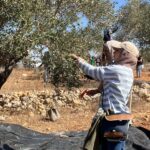The historic heart of Nabatieh in southern Lebanon was shattered by Israeli airstrikes that left many families trapped amidst rubble and destruction. Amina Bitar, 31 years old, is one of those who remain in the city, fighting for life as the relentless bombardment continues. Nabatieh, once a thriving market town, now lies in ruins, with its people living under the constant threat of violence and the loss of their heritage.
City’s Heritage in Ruins
Amina pointed to the heavy damage from her apartment in the heart of Nabatieh: the cracked stone walls, broken windows, and a giant crater where her neighbor’s house once stood. The Bitar family’s 100-year-old home, like so much of the town, has taken the daily pounding. Israeli airstrikes since late September have pummeled much of Nabatieh’s historic center into rubble, including its ancient market, an economic and cultural mainstay for over a century.
On October 16, an airstrike targeting the city hall killed 16 people, including the mayor and several municipal council members. This was just one in a series of devastating attacks that have eroded the fabric of Nabatieh’s community life.
“I pray for the war to end; I’m tired of everything,” Amina said. “Every Day, I’m nervous. My mental health is not good; no one is ever relaxed in their home.”
Razing of Nabatieh’s Famed Souk
Nabatieh’s souk, dating back to the Mamluk era, was renowned for its bustling Monday souk to which people from everywhere in the region flocked. Goods sold included spices, meats, fruits, and sweets, the intoxicating smells of sahlab and grilled kebabs filling the air. Today, it is almost unrecognizable, buried under layers of rubbish, a figment of a practically lost animation in the city.
The souk was the heart of economic activity,” said Mohanad Hage Ali, a political analyst with the Carnegie Middle East Center and a native of Nabatieh. “Its destruction is part of a wider [Israeli] campaign to destroy the ability of these towns and cities to come back to life.”
Surviving Amid the Rubble
Their survival is a day-to-day struggle. Amina’s father, Afeef, once ran a popular butcher shop in the market that was famous for the delicious lahmacun—a local specialty. Now, that business does not exist, and the family survives on essential supplies such as canned food, bread, and cheese brought in by a local taxi driver from Hassan Ali Sfewi.
Few people have spent as much time in Nabatieh as Sfewi, who has lived there for nearly 40 years. Now, he uses his aging Mercedes to run around the city, delivering essentials to families like the Bitars, who have no other source of support. He has chosen to stay in the city despite the constant threat of airstrikes. “Here, there is war, but at least there is water,” he said, noting that access to utilities in some displacement shelters is unreliable.
Sfewi also cares for his 90-year-old neighbor, Assad Bitar. He looks after the older man’s food and warmth as they stray through the city’s dangerous, rubble-filled streets.
More:U.S. Warns Turkey Over Hosting Hamas Leadership
Displacement and Uncertain Future
Nabatieh’s destruction has led to a displacement crisis across Lebanon. The UNHCR reports that approximately 20 percent of Lebanon is now displaced, vastly exceeding the 1,059 government-run shelters sitting at total capacity. Many Nabatieh residents are adamant about not leaving their homes, fearing overcrowding and inadequate shelter conditions.
“Where should we go?” Afeef asked, expressing the frustration felt by many who have nowhere else to turn.
Eroding Heritage and Memories
As the residents struggle to hold on to the remnants of their city, the loss is acute for those who have known the earlier city, especially in its historic center – Nabatieh. Hage Ali, whose childhood was spent amid the buzz in the old souk’s streets, described the destruction as “surgical” and emotionally wrenching. “It’s like someone surgically removed some of my memories, wiping them out in a split second,” he said.
He dreads returning to Nabatieh-a, a landscape he can no longer identify, only a “flat piece of land” remaining in place of the cherished memories.
Community Surviving
As the air raid continues, the future remains uncertain for those still in Nabatieh. The cultural and historic heart of the city has been hollowed out, leaving an emptiness that will be tough to fill. The damage also raises broader questions about the international response to this crisis, with Hage Ali venting criticism of the inaction.
There’s no clarity on where this is going, and there’s no pushback from the international community,” he said. “Israel has a free hand to design, with violence, the realities in the region.
For Amina, Afeef, and others who have lost so much, the hope for peace remains a distant, almost unimaginable reality. “Before the war, everything you could dream of was there,” Afeef said. “But now there’s nothing left. You can’t find anything.”















